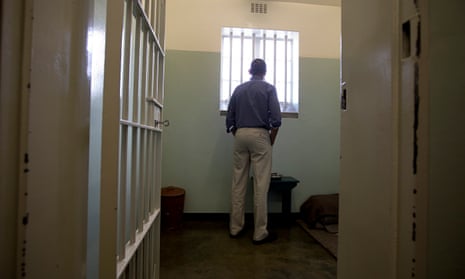Last Friday a 50-year-old man in Brixton prison tied bed sheets around his neck and hanged himself in despair. His death did not make a news story, nor did that of the prisoner who killed himself in Nottingham earlier this week. There has been a 64% increase in prison suicides this year, and 125 prisoners have committed suicide in the last 20 months. The death penalty has been abolished, yet too many people leave prison in a coffin.
Reforming prisons was once a great British cause. Can it become so again? Now that parliament is back and parties are hunting for policies to cut costs and modernise Britain here is one simple proposal that can save billions for taxpayers and go with the grain of British decency: cut the number of prisoners we have.
The justice secretary, Chris Grayling, admits that prisons are under pressure and have too many suicides but says there is no crisis. The chief inspector of prisons, Nick Hardwick, warns that the dramatic increase in prisoner suicides is a result of poor prison management. Prisoner suicides are “not acceptable in a civilised country” Hardwick says.
Criticising Chris Grayling, especially after his foolish ban on sending books to prisoners, is easy for liberals and the left. But in 2010, Labour home and justice secretaries handed their successors a prison system that was unfit for service and the root of the problem is that far too many people are incarcerated. It is time to call a party political ceasefire on the mutual denunciations that end up with too many people being decanted into prison without sufficient staff to oversee them or prevent suicides, let alone prepare prisoners for re-entry into society.
Under Margaret Thatcher – not known as a bleeding heart liberal – the prison population was kept well under 50,000. Under David Cameron it is approaching 100,000, far higher than comparable west European countries or Canada. Each year taxpayers pick up an enormous bill for the costs of running overcrowded prisons and the recidivism that arises because they are training centres for criminality.
Half of all adult prisoners are reconvicted within a year and three-quarters of prisoners under 18 leave prison and go straight back in. If our hospitals or schools had such a dreadful record there would be a public outcry.
As a former government minister who, on Christmas Eve last year was sent to Belmarsh – Britain’s hardest prison, supposedly reserved for murderers, terrorists and gunmen – then transferred to Brixton for the second half of my sentence, I saw the hidden face of prisons.
The filth and degradation were unbelievable. I was briefly imprisoned in a communist prison in Warsaw when arrested for running money to the, at the time, underground union Polish Solidarity in 1982. The food was better, the warders more humane and the cells cleaner than those in contemporary Britain.
Here, I met septuagenarians sent to rot for a minor white collar crimes, with no violence or financial loss to an individual. Prisoners who use wheelchairs and walking frames share the same space as men who scream and bang their heads against cell doors during the night. Men with serious hernias or colostomy bags walk around in agony; medical treatment is rudimentary. If you treat a man as less than a full human being do not be surprised if that is what he becomes.
The prison budget is £3bn a year more than the cost of the Foreign and Commonwealth Office, or Defra. Recidivism costs a further £13bn. In Sweden and the Netherlands they are closing prisons. In France, there are just 68,000 prisoners compared to 97,000 here. The UK has more prisoners than the proposed 80,000 strong British army. Non-custodial sentences, community service, fines and electronic surveillance are all better than throwing people into prison.
What might be done? First, the political parties need to stop the childish auction about which minister – or his or her shadow – can be tougher in insisting on custodial sentences.
Second, our judges need to be weaned off their obsession with sending people to prison. The average sentence increased by 25% between 2003 and 2013. The president of the supreme court, Lord Neuberger, has said that sending people to prison for six months or less is pointless. Yet each year our judges send around 40,000 people to prison for such short periods. 35,000 people who are in prison awaiting trial end up either being cleared or given non-custodial sentences. Why do judges send them inside in the first place?
Third, the tabloid editors and journalists now doing time need to send a message back to their colleagues that the endless demands for more and more people to be sent to prison is not making society safer. Countries that have lower incarceration rates also have lower crime rates.
Making prisons work is possible with some clear thinking by politicians and judges. Right now, British prisons shame our society and are not fit for purpose.
Denis MacShane is a former MP and minister who was sentenced to prison for six months for false expenses claims. His Prison Diaries are published by Biteback








